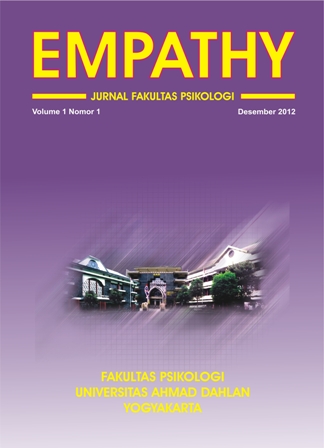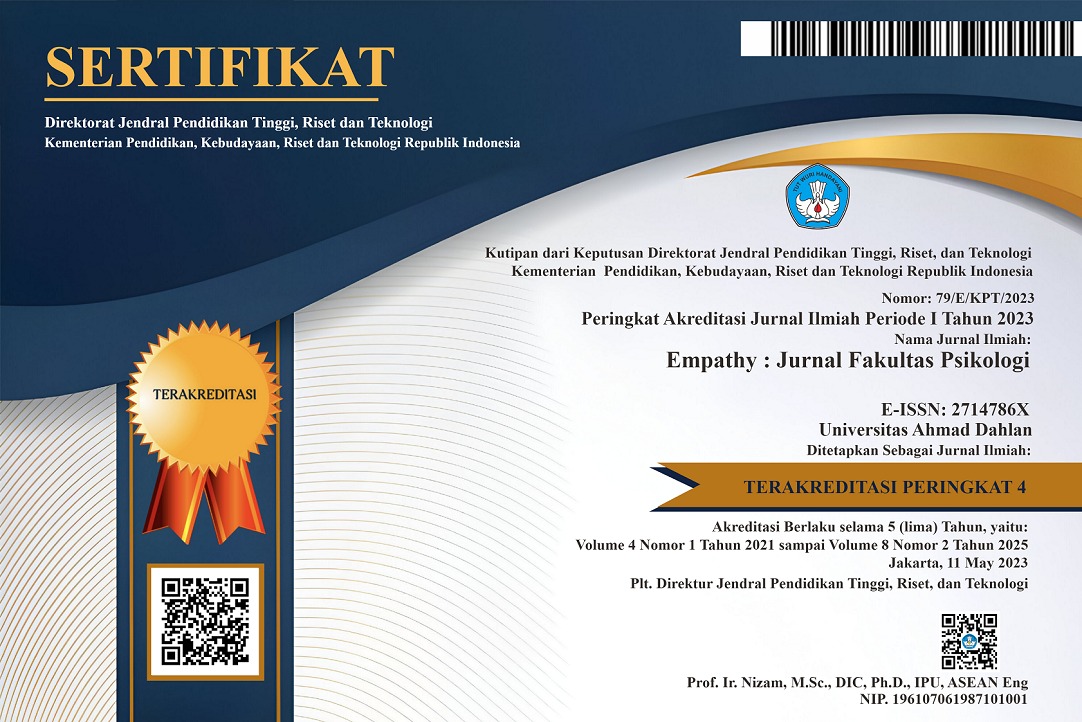Psychological capital and work engagement among strawberry generation employees
DOI:
https://doi.org/10.12928/empathy.v7i1.28794Keywords:
Psychological capital, Strawberry generation, Work engagementAbstract
Organizations require energetic and dedicated employees to achieve their goals through work engagement. Work engagement can be influenced by the unique characteristics of the strawberry generation, especially when combined with psychological capital. This study aims to determine the impact of psychological capital (self-efficacy, optimism, hope, and resiliency) on work engagement among strawberry generation employees. The research employs a quantitative method, measured using the Psychological Capital Questionnaire 24 (PCQ-24) and the Utrecht Work Engagement Scale 17 (UWES-17). The population used in this study consists of employees in Indonesia, from which 227 samples were selected using purposive sampling techniques. Data analysis was conducted using multiple linear regression analysis. The results of this study are: (1) there is no effect of self-efficacy on work engagement among strawberry generation employees, (2) there is a positive effect of optimism on work engagement among strawberry generation employees, (3) there is a negative effect of hope and resiliency on work engagement among strawberry generation employees, and (4) there is a positive effect of psychological capital on work engagement among strawberry generation employees.
References
Irawan, B. (2019). Organisasi formal dan informal: Tinjauan konsep, perbandingan, dan studi kasus. Jurnal Administrative Reform, 6(4), 195-220. https://doi.org/10.52239/jar.v6i4.1921
Bariqi, M. D. (2020). Pelatihan dan pengembangan sumber daya manusia. Jurnal Studi Manajemen Dan Bisnis, 5(2), 64–69. https://doi.org/10.21107/jsmb.v5i2.6654
Dwitiantiny, S., & Wijono, S. (2021). Budaya organisasi dengan employee engagement pada karyawan Credit Union (CU) Pancur Solidaritas Kebupaten Ketapang, Kalimantan Barat. Jurnal Ilmiah PSYCHE, 15(1), 13–24. https://doi.org/10.33557/jpsyche.v16i01.1748
Pri, R., & Zamralita, Z. (2017). Gambaran work engagement pada karyawan di PT EG (manufacturing industry). Jurnal Muara Ilmu Sosial, Humaniora, Dan Seni, 1(2), 295-303. https://doi.org/10.24912/jmishumsen.v1i2.981
Aprilianingsih, A., & Frianto, A. (2022). Pengaruh job demands dan job resources terhadap work engagement pada tenaga kependidikan di perguruan tinggi. Jurnal Ilmu Manajemen, 10(1), 173–184. https://doi.org/10.26740/jim.v10n1.p173-184
Sukoco, I., Fu’adah, D. N., & Muttaqin, Z. (2020). Work engagement of millennial generation employees at PT. X Bandung. Jurnal Pemikiran Dan Penelitian Administrasi Bisnis Dan Kewirausahaan, 5(3), 263-281. https://doi.org/10.24198/adbispreneur.v5i3.29953
Widanti, N. S., Mustami’ah, D., & Akhmad, G. N. (2019). Work engagement pada karyawan perusahaan pelayaran “X” cabang Surabaya. Seminar Nasional Kelautan XIV, 34-41. http://prosidingseminakel.hangtuah.ac.id/index.php/ps/article/view/230
Rustiawan, I., Almaududi Ausat, A. M., Gadzali, S. S., Suherlan, S., & Azzaakiyyah, H. K. (2023). Determinants of employee dedication to the company as a whole. Community Development Journal: Jurnal Pengabdian Masyarakat, 4(1), 708–712. https://doi.org/10.31004/cdj.v4i1.12454
Al Faizah, D. M. (2022). Pengaruh coworker support dan supervisor support terhadap work engagement melalui meaningful work. Jurnal Ilmu Manajemen, 10(3), 865–880. https://doi.org/10.26740/jim.v10n3.p865-880
Prasetyo, Y., & Farhanindya, H. H. (2021). Resiliensi dengan work engagement pada karyawan lapangan. CERMIN: Jurnal Penelitian, 5(2), 350-361. https://doi.org/10.36841/cermin_unars.v5i2.1356
Savitri, C. A., Anggraeni, N. L. P. N., & Santosa, D. F. (2023). Analisis faktor employee engagement terhadap kinerja karyawan di PT Sinkona Indonesia Lestari. Jurnal Manajemen dan Organisasi, 14(2), 110-124. https://doi.org/10.29244/jmo.v14i2.44680
Muslikah, E. D., Prasetyo, Y., Christanto, D., & Alexander, B. (2022). Coworker's support dan work engagement pada generasi milenial. Wacana Jurnal Psikologi, 14(2), 144-152. https://doi.org/10.20961/wacana.v14i2.59233
Purusottama, A., Ardianto, A., & Kadarusman, Y. B. (2022). A different magnitude of SME business model innovation: A lesson from the pandemic. Indonesian Journal of Business and Entrepreneurship. https://doi.org/10.17358/ijbe.8.2.182
Fauzi, F. I., & Tarigan, F. N. (2023). Strawberry generation: Keterampilan orangtua mendidik generasi Z. Jurnal Consulenza: Jurnal Bimbingan Konseling dan Psikologi, 6(1), 1-10. https://doi.org/10.56013/jcbkp.v6i1.2047
Supia, I., Hadi, C., & Fajrianthi, F. (2023). Nilai personal pada stay employee angkatan kerja generasi milenial dan generasi Z: Studi pada posisi marketing di salah satu bank swasta di Indonesia. Sang Pencerah: Jurnal Ilmiah Universitas Muhammadiyah Buton, 9(2), 385–392. https://doi.org/10.35326/pencerah.v9i2.2721
Putra, R. S. (2018). Pengaruh keterikatan kerja dan kepuasan kerja terhadap kualitas pelayanan. Psikoborneo: Jurnal Ilmiah Psikologi, 6(1). https://doi.org/10.30872/psikoborneo.v6i1.4529
Hazrati, P. R. (2017). Hubungan antara psychological capital dan work engagement pada karyawan perusahaan automotif di Lampung. https://dspace.uii.ac.id/handle/123456789/5982
Bandura, A. (1977). Self-efficacy: Toward a unifying theory of behavioral change. Psychological Review, 84(2), 191–215. https://doi.org/10.1037/0033-295X.84.2.191
Alvano, O. G., Matulessy, A., & Suhadianto, S. (2023). Optimisme pada karyawan produksi: Adakah peran konsep diri dan gratitude?. JIWA: Jurnal Psikologi Indonesia, 1(1). https://jurnal.untag-sby.ac.id/index.php/jiwa/article/view/9785
Buyukgoze-Kavas, A. (2016). Predicting career adaptability from positive psychological traits. The Career Development Quarterly, 64(2), 114–125. https://doi.org/10.1002/cdq.12045
Kurniawati, R., Latipun, L., & Hasanati, N. (2023). Hope sebagai mediator pengaruh authentic leadership terhadap work engagement pada anggota polisi. Jurnal Ilmiah Psyche, 17(2), 123-140. https://doi.org/10.33557/jpsyche.v17i2.2793
Rahmawati. (2016). Hubungan hope, happiness dan forgiveness terhadap marital adjustment pasutri di Kota Serang. Jurnal Penelitian Bimbingan dan Konseling, 1(1), 51-62. https://doi.org/10.30870/jpbk.v1i1.1895
Antonio, A. N., & Kurniawan, J. E. (2024). Pengaruh resiliensi terhadap kinerja karyawan dengan job insecurity sebagai mediator. Jurnal Ilmiah Edunomika, 8(2). https://doi.org/10.29040/jie.v8i2.13152
Putri, K. A. P., & Alfinuha, S. (2021). Menjadi pensiunan optimis dan tangguh: Korelasi optimisme dan resiliensi pada pensiunan TNI-AL. Psycho Idea, 19(1), 35-44. https://doi.org/10.30595/psychoidea.v19i1.7737
Stajkovic, A. D. (2006). Development of a core confidence-higher order construct. Journal of Applied Psychology, 91(6), 1208–1224. https://doi.org/10.1037/0021-9010.91.6.1208
Ferdinand, A. (2006). Metode penelitian manajemen: Pedoman penelitian untuk penulisan skripsi, tesis, dan disertasi ilmu manajemen. Semarang: Badan Penerbit Universitas Diponegoro.
Aulia, A. (2018). Keterikatan kerja ditinjau dari cinta pekerjaan, efikasi diri dan perceived organizational support. Tesis, Universitas Ahmad Dahlan, Yogyakarta.
Manurung, A. D. R. (2016). Alat Ukur Skala Positive Psychology Capital. Universitas Mercu Buana Jakarta, Indonesia.
Anggraini, G. (2021). Hubungan psychological capital dengan komitmen organisasi pada aparatur sipil negara. Cognicia, 9(2), 121-129.
Anggraini, N. P., & Fajrianthi, F. (2019). Peran psychological capital dalam hubungan persepsi dukungan manajemen dan kesiapan untuk berubah. Jurnal Psikologi Teori dan Terapan, 10(1), 85–94. https://doi.org/10.26740/jptt.v10n1.p85-94
Zega, M. A. Z., Nugraha, B. A., Muzaki, B. A., Al Fayadh, G. D., Resa, M. N. H., Mahesa, R. A. M. D., & Sari, Y. F. F. (2024). Dampak adanya generasi strawberry terhadap implementasi nilai-nilai Pancasila. Innovative: Journal of Social Science Research, 4(3), 3276–3290. https://doi.org/10.31004/innovative.v4i3.10560
Supia, I., Hadi, C., & Fajrianthi, F. (2023). Nilai personal pada stay employee angkatan kerja generasi milenial dan generasi Z: Studi pada posisi marketing di salah satu bank swasta di Indonesia. Sang Pencerah: Jurnal Ilmiah Universitas Muhammadiyah Buton, 9(2), 385–392. https://doi.org/10.35326/pencerah.v9i2.2721
Suhery, Ravelby, T. A., Linda, M. R., & Nurofik, A. (2020). Pengaruh self-efficacy dan employee engagement terhadap kepuasan kerja karyawan perbankan di Padang. Jurnal Media Bina Ilmiah, 15(4), 4239–4248. https://doi.org/10.33758/mbi.v15i4.772
Rohmawati, R., & Nurcholis, L. (2019). Studi peran self efficacy dan kompetensi profesional terhadap knowledge donating dan kinerja guru. Jurnal Riset Ekonomi dan Bisnis, 12(3), 145-166. http://dx.doi.org/10.26623/jreb.v12i3.1758
Ariani, A., & Nugroho, Y. A. (2019). Pengaruh occupational self-efficacy terhadap work engagement yang dimediasi oleh human resource development climate di PT Olympic Bangun Persada. Jurnal Manajemen, 16(2), 167-179. https://doi.org/10.25170/jm.v16i2.896
Aulia, S., Meilani, T., & Nabillah, Z. (2022). Strawberry generation: Dilematis keterampilan mendidik generasi masa kini. Jurnal Pendidikan, 31(2), 237. https://doi.org/10.32585/jp.v31i2.2485
Mulyadi, A. Z., & Jadmiko, P. (2023). Pengaruh efikasi diri, lingkungan kerja dan lingkungan organisasi terhadap keterlibatan kerja pada PDAM Thirta Khayangan Sungai Penuh. Kumpulan Executive Summary Mahasiswa Prodi Manajemen Wisuda ke 80 Tahun 2023, 23(2). https://ejurnal.bunghatta.ac.id/index.php/JFEK/article/view/23294
Chan, X. W., Kaliath, T., Brough, P., O’Driscoll, M., Siu, O.-L., & Timms, C. (2017). Self-efficacy and work engagement: Test of a chain model. International Journal of Manpower, 38(6), 819–834. https://doi.org/10.1108/IJM-11-2015-0189
Putri, A. N. L., & Frianto, A. (2022). Pengaruh self-efficacy terhadap job satisfaction melalui work engagement pada karyawan. Jurnal Ilmu Manajemen, 10(1), 357–369. https://doi.org/10.26740/jim.v10n1.p357-369
Gow, J. P., & Rodhiah. (2019). Pengaruh optimisme kewirausahaan yang dimoderasi oleh gaya kognitif terhadap ketekunan kewirausahaan UKM bidang kuliner di Jakarta Barat. Jurnal Manajerial dan Kewirausahaan, 1(3), 515-523. https://doi.org/10.24912/jmk.v1i3.5363
Azzahra, S., & Budiman, A. (2022). Pengaruh psychological capital terhadap work engagement pada crew outlet. Bandung Conference Series: Psychology Science, 2(2), 115-122. https://doi.org/10.29313/bcsps.v2i3.2899
Kasali, R. (2018). Strawberry Generation. Mizan. https://books.google.co.id/books/about/Strawberry_Generation.html?id=DuBMDwAAQBAJ&redir_esc=y
Yudhawati, D. (2018). Implementasi psikologi positif dalam pengembangan kepribadian mahasiswa. Psycho Idea, 16(2), 111-118. https://doi.org/10.30595/psychoidea.v16i2.3363
Liwarto, I. H., & Kurniawan, A. (2015). Hubungan psycap dengan kinerja karyawan PT. X Bandung. Jurnal Manajemen Maranatha, 14(2), 223-243. https://doi.org/10.28932/jmm.v14i2.36
Febrian, A., & Hastjarjo, D. (2014). Pengaruh meaningful work, harapan, dan kemembalan terhadap work engagement [Thesis, Universitas Gajah Mada]. https://etd.repository.ugm.ac.id/home/detail_pencarian/69150
Rastati, R. (2018). Media literasi bagi digital natives: Perspektif generasi Z di Jakarta. Jurnal Kwangsan, 6(1), 60-73. https://doi.org/10.31800/jtp.kw.v6n1.p60-73
Sallata, J. M. M., & Huwae, A. (2023). Resiliensi dan quarter life-crisis pada mahasiswa tingkat akhir. Jurnal Cakrawala Ilmiah, 2(5), 2103–2124. https://doi.org/10.53625/jcijurnalcakrawalailmiah.v2i5.4725
Khairunnisa, A., Pranandari, K., & Avavidya, A. (2022). Resiliensi dan work engagement pada agen asuransi. Arjwa: Jurnal Psikologi, 1(3), 129-138. https://doi.org/10.35760/arjwa.2022.v1i3.7305
Meiliana, M. (2020). Psychological capital dan stres kerja pada karyawan di PT. MN. Psibernetika, 13(1), 9-19. http://dx.doi.org/10.30813/psibernetika.v13i1.2313
Maharani, A. C. (2021). The influence of excessive use of social media. Indonesian Journal of Social Sciences, 13(1), 11. https://doi.org/10.20473/ijss.v13i1.26351
Septianto, M. A. A. (2022). Pengaruh psychological capital terhadap work engagement karyawan Tugu Media Group [Universitas Islam Negeri Maulana Malik Ibrahim]. https://etheses.uin-malang.ac.id/id/eprint/44282
Hariyadi, M. H. (2019). Pengaruh psychological capital terhadap work engagement pada karyawan. Cognicia, 7(3), 359–368. https://doi.org/10.22219/cognicia.v7i3.9200
Downloads
Published
Issue
Section
License
Authors who publish with Empathy: Jurnal Fakultas Psikologi agree to the following terms:
- Authors retain copyright and grant the journal right of first publication with the work simultaneously licensed under a Creative Commons Attribution License (CC BY-SA 4.0) that allows others to share the work with an acknowledgment of the work's authorship and initial publication in this journal.
- Authors are able to enter into separate, additional contractual arrangements for the non-exclusive distribution of the journal's published version of the work (e.g., post it to an institutional repository or publish it in a book), with an acknowledgment of its initial publication in this journal.
- Authors are permitted and encouraged to post their work online (e.g., in institutional repositories or on their website) prior to and during the submission process, as it can lead to productive exchanges, as well as earlier and greater citation of published work.

This work is licensed under a Creative Commons Attribution-ShareAlike 4.0 International License.




